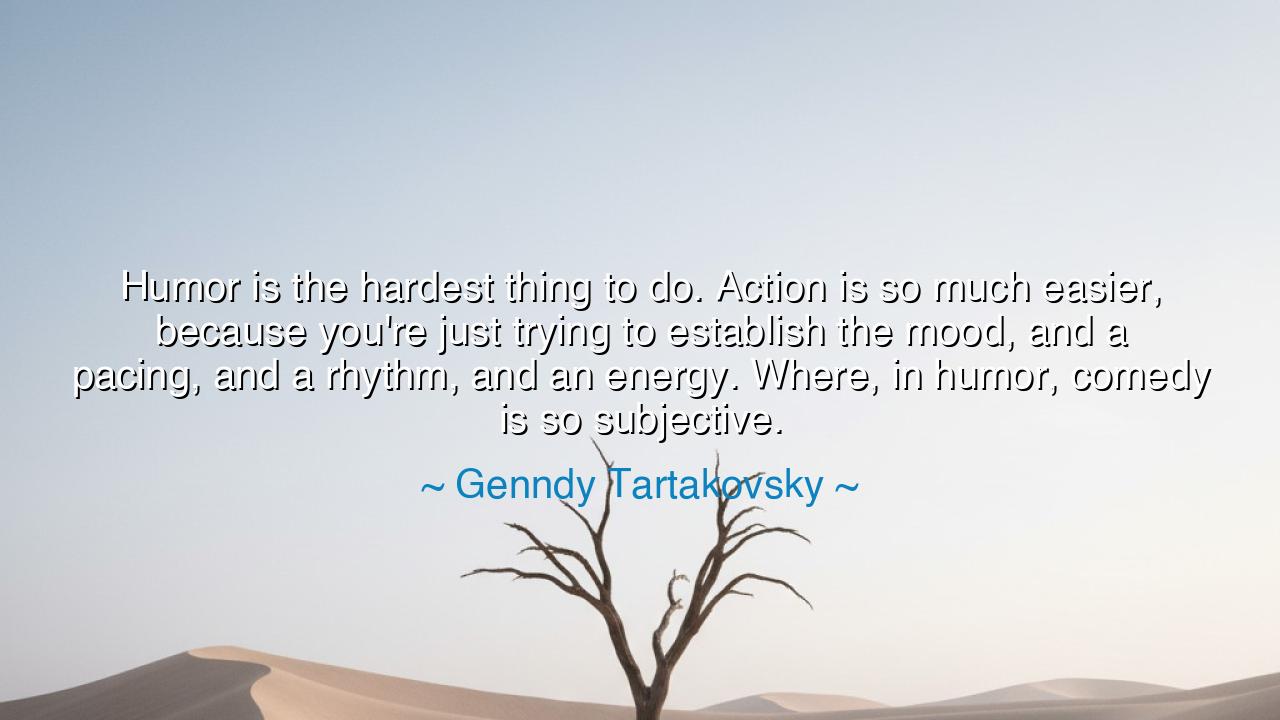
Humor is the hardest thing to do. Action is so much easier
Humor is the hardest thing to do. Action is so much easier, because you're just trying to establish the mood, and a pacing, and a rhythm, and an energy. Where, in humor, comedy is so subjective.






"Humor is the hardest thing to do. Action is so much easier, because you're just trying to establish the mood, and a pacing, and a rhythm, and an energy. Where, in humor, comedy is so subjective." These words, spoken by Genndy Tartakovsky, carry with them a deep truth about the complexity and subjectivity of humor. In a world where humor is often regarded as a simple, joyful escape, Tartakovsky’s reflection calls attention to the difficulty inherent in crafting something that speaks to the heart, the mind, and the spirit all at once. While action in storytelling may follow a clearer rhythm and pacing, humor is an elusive force, shaped by the individual, by their experiences, and by the very culture in which it is expressed. The challenge of humor, therefore, lies in its subjectivity—in its capacity to be both deeply personal and universally shared, often dependent on the nuanced dance of timing, context, and relatability.
In the ancient world, comedy was seen not just as entertainment but as a powerful reflection of human nature. Aristophanes, the great Greek playwright, is celebrated for his ability to use humor to reflect on the absurdities and flaws of society. His comedies, while filled with wit and laughter, also carried deep social commentary. Yet, his humor was not universally appreciated—it was subjective, shaped by the unique context of Athenian society. To some, his plays were a source of great joy; to others, they were uncomfortable, even subversive. Just as Tartakovsky points out, the challenge of humor lies in its elusiveness, its ability to touch upon different emotions and interpretations depending on the individual. This is what made it so difficult to master and why humor cannot be reduced to mere formulas.
Consider the life of Socrates, who used humor and irony as a tool for revealing the ignorance of those who thought themselves wise. His ironic humor, especially in the Socratic method, was a means of guiding others toward truth by forcing them to laugh at their own contradictions. But, as Plato writes in The Symposium, Socrates was not always understood by his peers, and his humor did not always evoke laughter. For some, it was a source of great discomfort—they did not find joy in his questions, but rather frustration and unease. Socrates’ humor, like Tartakovsky’s insight, was subjective: some would find it enlightening, others would find it perplexing or disruptive. This disparity in humor is what made it a powerful, yet difficult, tool.
The challenge of humor can also be seen in the example of William Shakespeare, whose plays often blended comedy and tragedy. His comedies, such as A Midsummer Night's Dream, played with the complexities of human relationships, love, and desire, and they brought humor to the confusion and chaos of the human experience. Yet, just as Tartakovsky observes, the humor in Shakespeare’s work is not always easy to grasp. What might be hilarious to one audience could be lost on another, particularly when it is rooted in the cultural context of Elizabethan England. Shakespeare’s work highlights how humor can be a vehicle for reflection on society and human nature, but also how it requires a careful understanding of timing, pacing, and delivery—skills that cannot be easily translated from one time or culture to the next.
In the realm of modern storytelling, Tartakovsky himself embodies this challenge. As a creator of animated series like Samurai Jack and Dexter’s Laboratory, his work is filled with moments of visual and verbal humor that depend heavily on timing and pacing. His ability to draw laughter from his audience is not just about presenting a joke, but about creating a rhythm—a dance between the action and the comedy. In this, Tartakovsky reveals that humor, while often seen as a light-hearted escape, is a carefully crafted art that requires more than just wit or cleverness; it demands an understanding of human emotion, connection, and the power of timing. It is this complexity that makes humor, as he suggests, so much harder to master than mere action.
The deeper lesson in Tartakovsky’s words is that humor is an expression of human connection, but it is also deeply rooted in the subjectivity of the human experience. What makes one person laugh may leave another cold or confused, and therein lies the challenge of crafting humor that resonates across different minds and hearts. Yet, the very difficulty of humor is what makes it such a powerful tool—it connects us in ways that simple action or drama cannot. It forces us to confront the complexity of our emotions, to laugh at the absurdities of life, and to embrace the joy of being human.
So, dear listener, take this wisdom to heart as you navigate the challenges of your own life. Remember that humor is not something that can be forced or manipulated. It arises naturally, and sometimes, it takes time to fully understand or appreciate the humor in our own dilemmas. When faced with difficulty, do not be afraid to laugh, to step outside of the seriousness of the world and find humor in the complexity of it all. Just as Socrates and Shakespeare used humor to reflect on the human condition, so too can you use it to gain perspective and connect with others. Understand that while humor may be subjective, its ability to unite us through shared laughter and understanding is one of life’s greatest gifts.






AAdministratorAdministrator
Welcome, honored guests. Please leave a comment, we will respond soon